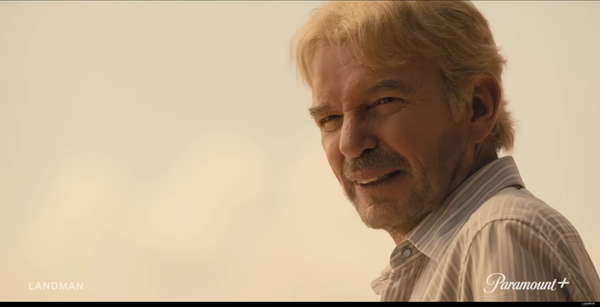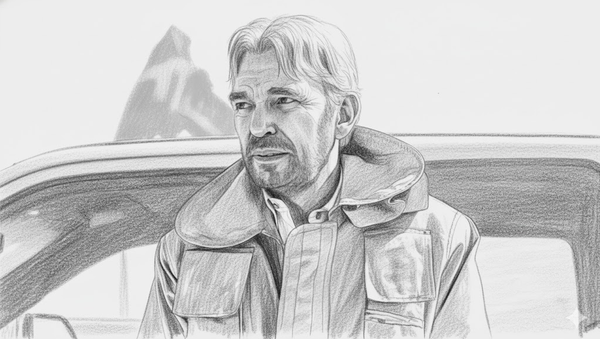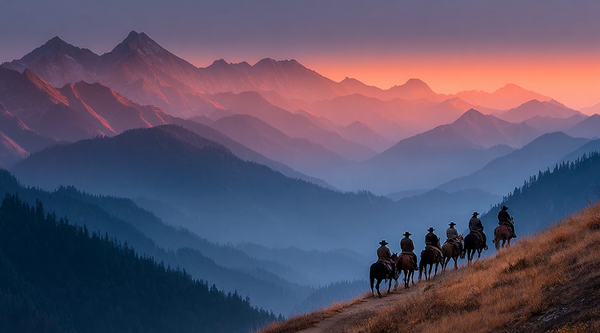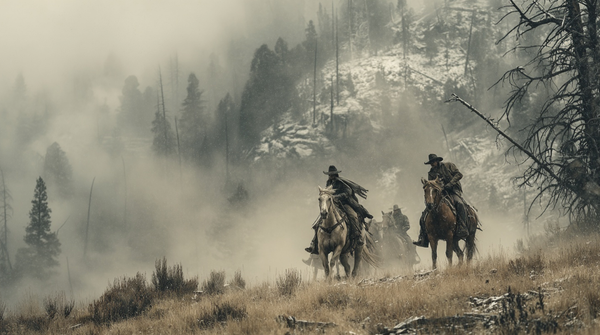Beneath Our Feet, Both Home and Battleground — Revisiting a Century of Solitude in the Yellowstone Universe
As a cross-cultural enthusiast, I’ve long been captivated by the wild horses, gunfire, and family oaths that course through “Yellowstone.” That’s why I wrote this piece: to peel back the sweeping vistas and plunge into the story’s deeper currents.
I’ve tried to avoid lengthy academic analysis and empty slogans. Instead, I want to talk about the three oldest elements that shape this Western epic:
Land, men, and women.
And how, across a vast and unforgiving landscape, their fates entwine into a saga of love and conflict that stretches over a century.

Land: The Wellspring of Bloodlines, the Bedrock of Civilization
The runaway success of “Yellowstone” spawned a sweeping saga — “1883,” “1923,” and the still-to-come “1944.” Taylor Sheridan’s narrative alchemy has ignited a bonfire on the Western plains, one that refuses to burn out. At the heart of that fire lies the land.
Land is where every story begins. In “1883,” the first generation of Duttons water their westward journey with blood and tears, braving untamed nature and sacrificing an entire generation to finally plant the family’s flag in this promised land. Fast-forward to “1923” and modern-day “Yellowstone,” and time may pass, but the Duttons’ mission remains unchanged: to defend their ancestral ground against all who would claim it.
Within the Yellowstone universe, land is no mere commodity. It is a family’s lifeblood, the fertile ground from which civilization springs. Economists call land “the mother of wealth,” but Sheridan renders it sacred. Land means cultivation, harvest, and the accumulation of riches; it is also the foundation for home, family, and belonging. Every inch of soil carries a distinct way of life, nurtures a particular culture, and records the rise and fall of a lineage. It bears silent witness to it all.

When the land beneath one’s feet is taken, the civilization built upon it inevitably crumbles. The history of the American West is, at once, the saga of pioneers like the Duttons and the tragedy of the dispossessed — the Native Americans whose tears and blood stain the soil. Agrarian life supplanted the old ways of hunting and fishing; those first peoples were driven onto barren reservations, fighting to preserve their culture even as they were uprooted, like trees torn from their native earth, destined to wither. Sheridan, ever attuned to myth, invokes the story of Antaeus: the hero who, once separated from his mother earth, loses all his strength.
The Dutton patriarchs understand this lesson intimately, having witnessed the devastation that follows the loss of one’s homeland. That profound fear hardens into an ironclad resolve — a near-obsessive determination to defend the Yellowstone ranch at any cost, even life itself. Such devotion to land is not unique to Americans; it resonates deeply with the Chinese, too. The reverence and dependence the villagers of Bailuyuan feel for their soil, as depicted in “White Deer Plain,” echo across cultures, binding us in a shared emotional truth.
Men: Guardians of the Land, Architects of Order
For land this precious, the logic of ownership reverts to its most primal form. It is not dictated by contract or market, but by the ultimate arbiter: force. Only the strongest, the most resilient, those willing to endure sacrifice, are deemed worthy of possession. Thus, masculine strength and the instinct to protect become the backbone of the narrative.
Sheridan’s vision of “manhood” is not simply a matter of biology, but a social identity earned through trials, responsibility, and sacrifice. A man must defend the land, uphold the family legacy, shelter his kin. He is tasked with imposing order on the world outside and forging an unbreakable resolve within. Inner fortitude and outward achievement reflect one another; only by standing firm in spirit can a man weather the storms of reality and hold his ground.

Each generation of Dutton patriarchs stands as an embodiment of old-school American virtue: men of honor, unyielding in their word, resilient, loyal to family and community. They are the pillars on which the family rests, and mentors to those who follow. Take Jimmy, for example — a young man scorned as “white trash,” forged by the crucible of the Yellowstone ranch into a true cowboy. His transformation is shaped by the stern guidance of John Dutton, the support of his peers, and the tenderness of love. But at its core, it is Jimmy’s own choices — made in pain and adversity, again and again — that drive his becoming. Manhood, here, is not inherited but earned, carved out in the struggle against the world, one hard-won step at a time.
Women: The Embodiment of the Land, the Eternal Witness
In the early seasons of “Yellowstone,” women often seemed cast in utilitarian roles, their presence serving to advance the arcs of men. Even the incandescent Beth, for all her ferocity, is wielded like a blade by the family — her vulnerabilities and tenderness surfacing only in the shadows of Rip or Jamie.
But as the story winds back to “1883,” Sheridan’s pen undergoes a transformation. Elsa Dutton bursts onto the scene as the brightest, most unfettered soul in the universe — young, beautiful, unafraid to love or to lose. Along a perilous journey, she forges unforgettable bonds with cowboys and Native warriors alike. Most crucially, it is Elsa’s lyrical narration that threads through the series, her perspective hovering above the fray — detached, poetic, quietly bearing witness to the heartbreak and wonder around her. Elsa is, in essence, the land itself: primal, pure, brimming with vitality. She accepts all, nurtures civilization, and watches as generation after generation comes and goes. Only she — transformed into the earth — remains eternal.

By the time we reach “1923,” the symbolism grows even sharper. Alexandra, arriving from Europe, brings with her the passions and romance of the Old World — she is a wild current injected into the continent’s veins. Meanwhile, Teonna Rainwater, the Native girl, stands for the land’s indomitable spirit and its suppressed fury. Together, they perfect the metaphor of land as woman — a tradition with deep roots in American literature. Think of Scarlett and Melanie in “Gone with the Wind,” their union forming the archetype of the resilient, graceful Southern earth mother.
Some may argue that such symbolism relegates women to the roles of the conquered or the protected. But consider this: men are merely fleeting presences on the land, their battles, conquests, and creations just passing scenes in earth’s endless cycle. The true protagonist is the land itself — nurturing, enduring, bearing witness to all.
Who first saw the moon by the riverside? When did the moon first shine on man?
Sheridan’s Yellowstone universe is more than a chronicle of Western turmoil; it is an ancient meditation on the relationship between people and the land. We are all searching for our roots. Each generation wrestles with fate and the ground beneath our feet, in a struggle and reconciliation that never truly ends. The story continues on screen — and, in life, each of us writes our own epic on the land we call home.



